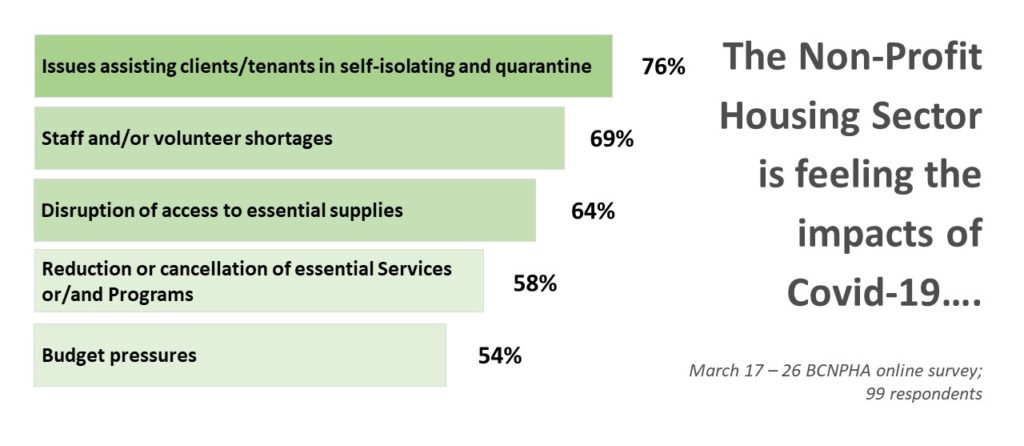The COVID-19 public health emergency is presenting unprecedented challenges to the non-profit housing sector. To advocate effectively for supports and resources, and to be responsive to sector needs, BCNPHA gathered feedback from 101 providers from all regions of the province between March 17-26.
The Covid-19 crisis burdens both tenants and providers. Impacts are felt differently based on organizations’ locations, capacity, and importantly, the population they serve. 76% of respondents noted a challenge in how to assist clients/tenants in self-isolating and quarantine. 69% were impacted by staff and/or volunteer shortages and 64% experienced a disruption of access to essential supplies.
Many organizations are urgently looking for support in achieving client/tenant isolation. Some are struggling to keep up basic safety and health procedures.
- In light of staff shortages and the lack of some essential cleaning and protective supplies, providers will be forced to be creative in ensuring that clients/tenants can safely and effectively self-isolate.
- The current situation induces mental stress for all of us, but more so for the clients and tenants who are already prone to anxiety and especially those struggling with mental illness. For providers working with clients with significant mental illness, achieving compliance and managing isolation is a challenge as tenants may not be willing or able to follow social distancing procedures (resulting in escalating behavior for some).
- For tenants, there are challenges with the stoppage of visitors, non-essential programming, and in-person communication, which in turn is leading to further isolation. The lack of socialization furthers anxiety and stress. Especially as the pandemic may worsen, the usual supports to vulnerable clients, especially seniors, may not be available and isolated and vulnerable tenants will be severely impacted. New ways to connect and support those struggling with isolation are needed.
- Services and facilities for those experiencing homelessness are not set up for quarantine and distancing. Isolation without a safe drug supply is not tenable for those living with addiction.
- A reduction or cancellation of essential services or/and programs is especially problematic for
- Food delivery
- Maintenance
- Cleaning
- Recreational programs (leading to isolation)
- Assistance with rent and income supplements
Staff shortages have become a significant financial and operational problem in the sector
“Staff are dropping like flies. Having to stay home with sickness. Or no childcare”
“I am the only person staffing our building, if I do not come to work there is no one to fill in”
- Operations have justifiably been pulled back to a minimum across organizations to minimize risk of exposure of staff and tenants/clients or visitors. Due to recent travel, staff staying home for exhibiting flu-like symptoms or not being able to work due to child care, or/and staff simply being too scared to work, many organizations are down to a few essential staff with minimal emergency or no further replacements. Resulting staff shortages result in a general fear to not be able to continue essential services.
- Ensuring safe homes for tenants urgently requires additional staffing (incl. cleaning, maintenance, front-line staff, security) and more sanitation and disinfecting supplies.
- Specific staffing issues include:
- Few casual workers are available to work shifts.
- Front-line/client-facing (especially overnight) workers, are desperately needed.
- Housekeeping and maintenance staff are needed. Cleanliness and hygiene will become an issue and finding maintenance support is already challenging.
- Volunteers are not available to provide food delivery
- Workers, who are often already underpaid, are understandably very nervous and seek “danger pay”.
- Security to support with distancing (i.e. at doors/re guests)
- Long turnaround times on receiving test results means that staff cannot return to work.
Essential supplies are needed
- Agencies, across the board, are urgently needing more hand sanitizer and sanitizing wipes. A number of other regular items are also getting difficult to find, relating to cleaning and sanitation, in particular masks and gloves, disinfectant/bleach and even toilet paper.
- Supplying independently-living and now isolated households with food is a problem for some providers (i.e. seniors, disabled residents, others facing multiple barriers and those who will have to quarantine). More staff or volunteers to provide food-deliveries are needed in the short-term.
- Notably, a few members in areas outside of Greater Vancouver/ Greater Victoria are reporting that they are observing impacts on their regular food supplies (responses from Quesnel BC, Prince George, Kelowna, Port Alberni, Revelstoke, Fort Nelson). Some food banks seem to be low on food for distributions. It is unclear if this is community-specific or a broader issue.
Operational budgets are squeezed on both ends
- Budgets are severely strained by the crisis. Rental revenues, fundraising (galas, donations, sponsors, events) and social-enterprise incomes will be drastically lowered, while additional over-time or the cost of backfilling for regular staff being off sick will stretch expenses. Many additional cleaning and essential supplies are not budgeted for, which is a concern for some organizations. Funder flexibility is requested to maintain operations.
Where to invest additional funding?
Funding should go to “supporting people who cannot pay their rent; procurement of necessary equipment and supplies” and “meeting basic needs (food delivery, transportation, cleaning etc.)”
- Respondents suggested that additional government funding to combat COVID-19 should be directed to provide essential supplies, cover staff cost for house-keeping, contingency staff and additional hours dedicated to preparedness and tenant support. This also includes staff to help tenants who are isolated or alone, especially those who may be compromised and cannot access the needed supplies and food without putting themselves into situations that could possibly be high risk for infection. Cleaning should be provided to ensure all suites and common areas are kept clean.
Download the Executive Summary here.
